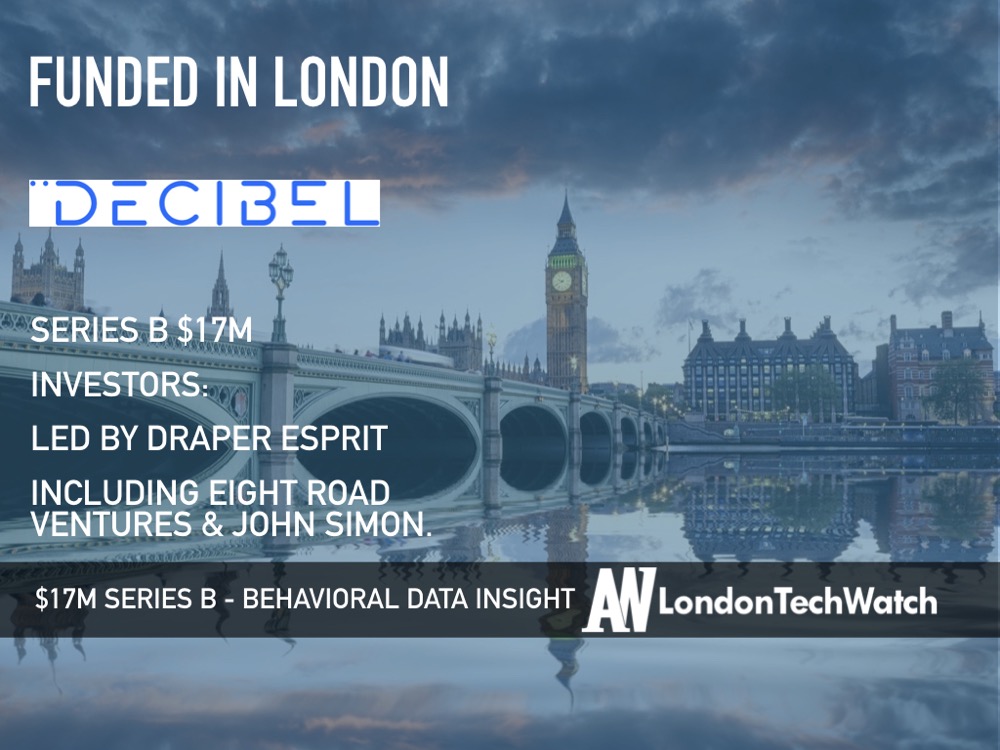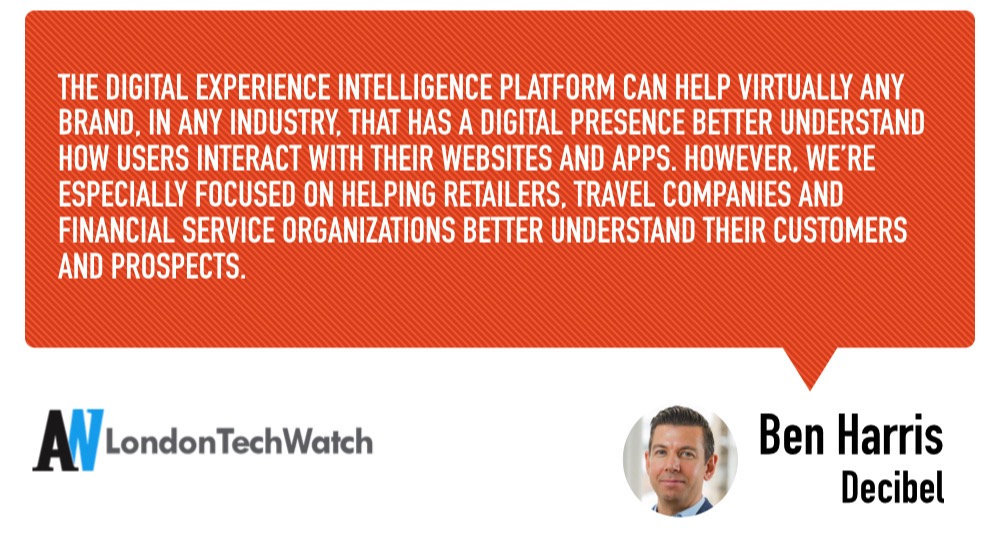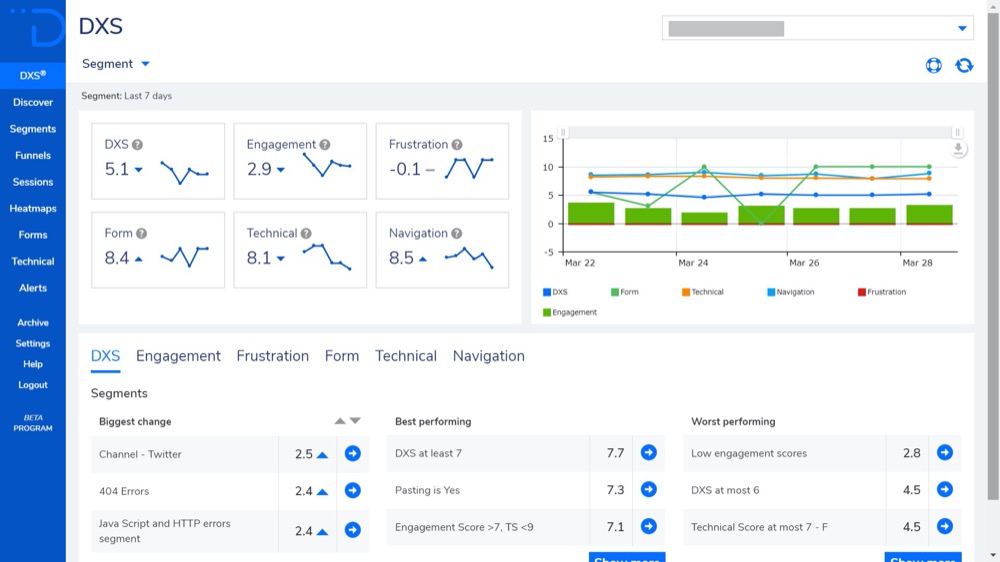A solid digital experience is essential for hitting conversation rates and revenue goals, but every digital experience has pain points. Decibel helps companies analyse and improve user experience through its digital experience intelligence platform. Decibel captures user behavior through its scalable, machine learning platform that analyses user interaction through various ways including mouse movements, clicks, hovers, session replays. Decibel also offers a scoring system, accessible through an API, that allows brands to pinpoint how and where to optimize digitally for better experiences.
London TechWatch spoke with Ben Harris about expanding Decibel (TF of $26M across three rounds) and how its platform is helping brands optimize the flood of online shoppers during the holiday season.
Who were your investors and how much did you raise?
Decibel just closed a Series B investment round totaling $17M. The round was led by Draper Esprit, one of the most active venture funds in Europe. Investors from Decibel’s Series A funding round also participated in the investment, including Eight Road Ventures and John Simon, via his VentureForGood investment entity.
Tell us about the product or service that Decibel offers.
Decibel’s Digital Experience Intelligence platform enables businesses, such as British Airways, LEGO and River Island, to understand and improve the website and app-based customer experiences. The first-of-its-kind, scalable platform uses machine learning to capture unique experience data. These insights reveal negative, neutral, and positive digital body language insights, which brands can leverage to improve conversion rates, and thus increase revenue.
Customers also have access to the universal metric for measuring experiences online: Decibel’s Digital Experience Score. The flexible, API-based scoring system automatically quantifies the quality of experiences and can be segmented across all digital platforms for immediate insight into where the biggest opportunities lie. The metric, which can be integrated with other technologies, offers marketers, web developers, and user experience teams to investigate exactly how and where to optimize digitally for better experiences.
 What inspired the start of Decibel?
What inspired the start of Decibel?
I attribute my aspiration to start a business to my long line of entrepreneurial family members. Holding roles in business development and at digital advertising agencies early in his career, I quickly realized my passion for helping brands reach their customers more effectively. At the age of 27, I started an agency with the intention of helping friends with websites navigate the complex marketing landscape.
I quickly recognized a growing market need for understanding the exact cause of problems on websites. And, after collaborating with Tim de Paris, Decibel’s co-founder and current CTO, we developed a technology that could solve this challenge, establishing Decibel.
Who do you consider to be your primary competitors?
Clicktale and Quantum Metric.
How is Decibel different?
Decibel sets itself apart by offering reasoning behind why customers exert certain behaviors online. Traditional digital analytics tools, such as Net Promotor Scores (NPS) and A/B testing are critical for brands, too. However, Decibel’s Digital Experience Intelligence platform and Digital Experience Score provide deeper intelligence that brands need in order to understand why customers make purchase decisions on digital platforms, helping the entire organization better cater strategies that will result in successful conversions.
What market is Decibel targeting and how big is it?
The Digital Experience Intelligence platform can help virtually any brand, in any industry, that has a digital presence better understand how users interact with their websites and apps. However, we’re especially focused on helping retailers, travel companies and financial service organizations better understand their customers and prospects.
What’s your business model?
Decibel operates on a Software-as-a-Service, recurring revenue model.
What was the funding process like?
The funding process was a very busy time – many 18-hour working days. When in London, there were times I could put my kids to bed and then have three back-to-back U.S. VC pitches through to midnight. Every VC we reached out to took a call, and that required a lot of pitching and follow up, but luckily we were super organized with our Data Room.
There is nothing like an investment round to help you learn about which metrics to optimize. Whereas during Series A, I was very involved in sales and so very short of time, but during Series B, with a larger infrastructure, I could spend more time getting into the detail and I used the process as a learning opportunity. This has enabled me to approach how I track and think about the business differently.
Not only did we end up with a host of offers, but we also ended up with new knowledge and a number of talented new contacts that added to our network. It feels a lot like we have a seat at the table now and have the right to spar with the best and brightest global players.
What are the biggest challenges that you faced while raising capital?
It was portraying the vast opportunity, how few competitors there are, the direction the market is headed and just how relevant and differentiated our technology is to deliver immense growth now and later. No one simply believes you on the face of it. But because the current form of the market is nascent, the market ‘experts’ don’t fully understand it themselves. So often a VC takes interest in the pitch, has a couple of calls with people they know in the market and then discusses it with their partners without further discussion with you, and whatever they decide there is no changing. So, when some VCs came back to give the verdict, no matter what the reality was, all I could do was to thank them for taking a look! Of course, as I learned, I optimized my deck to address their points upfront, which ultimately results in several term sheets. It was a rollercoaster.
What factors about your business led your investors to write the check?
Our investors feel that digital-based interactions, across industries like retail, travel and financial services, have changed expectations around what it means to have an exceptional digital customer experience. This shift has created growing competition and increasing customer expectations, particularly online, making the customer experience one of a business’ greatest competitive advantages.
According to Nicola McClafferty, Investment Director, Draper Esprit, “Decibel’s comprehensive platform and unique approach to measuring and impacting digital customer experience is delivering significant value to its already impressive list of customers. We have been really impressed with the growth in the business, across EMEA and the U.S., over the last couple of years and the impact that Decibel is delivering to their customers, not just in marketing but across functions including customer service, engineering, and product. We are excited to partner with Ben and the team as they continue to expand the business globally.”
What are the milestones you plan to achieve in the next six months?
Throughout the next six months, we are planning to enhance Decibel’s experience-focused technology to the next level. We’re also aiming to expand our presence across Europe and North America.
What advice can you offer companies in London that do not have a fresh injection of capital in the bank?
There are two things that enable me to sleep at night. One is knowing my online to-do list is up to date, so I don’t have to retain my task list in my head, and the other is money in the bank. Having grown an agency services business organically, and now Decibel, investing for top-line growth, I’ve seen the business from two sides. If you’re well-capitalized, it means market share. Organic growth means risking the chance of someone else leapfrogging you. It’s a Prisoner’s Dilemma of sorts.
There are two things that enable me to sleep at night. One is knowing my online to-do list is up to date, so I don’t have to retain my task list in my head, and the other is money in the bank. Having grown an agency services business organically, and now Decibel, investing for top-line growth, I’ve seen the business from two sides. If you’re well-capitalized, it means market share. Organic growth means risking the chance of someone else leapfrogging you. It’s a Prisoner’s Dilemma of sorts.
With respect to timing, with much chaos in the world from a macroeconomic standpoint we felt it was generally a good time to raise funds. But while many say it’s easy to raise right now because there’s loads of money floating about, I haven’t met anyone that found raising institutional money ‘easy’. It’s time-consuming and your metrics need to be attractive.
Where do you see the company going now over the near term?
Right now, we’re hyper-focused on helping our customers gear up for the holidays. An influx of people flood websites and apps between Thanksgiving and New Year’s, presenting many opportunities for brands to provide a positive experience and encourage visitors, new and returning, to make purchases. Decibel is “all hands on deck” throughout the next month, ensuring that our customers are equipped to achieve those goals and maximize their revenue potential during such a critical time of year.
What is your favorite restaurant in London?
Actually, I’ve shunned the world of overpriced restaurants having taken up cooking last year at the age of 44. I’m now obsessed with Riverfood and Gousto recipe boxes and my own chocolate desserts! So, my best restaurant right now is Chez-Ben (my house!).






